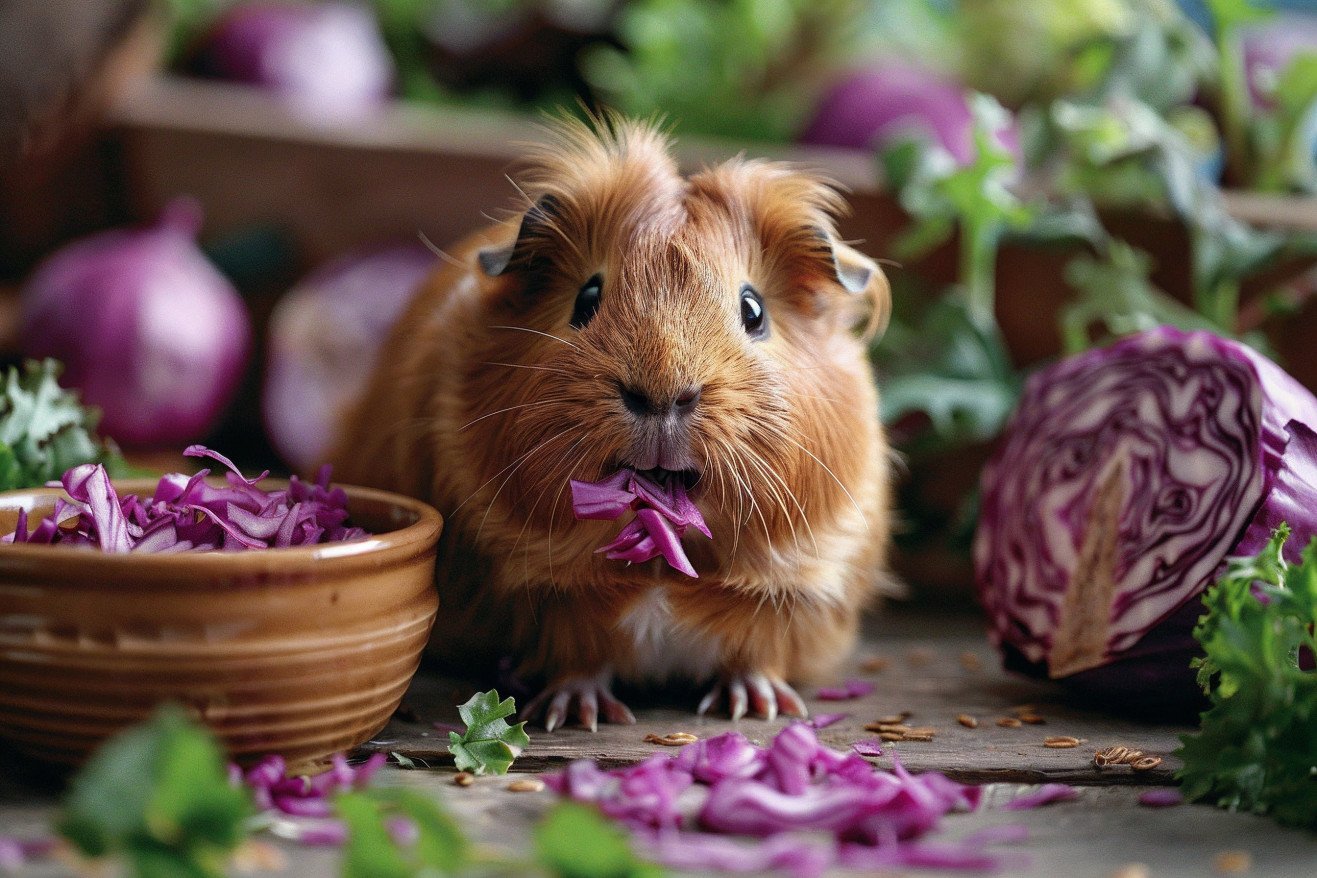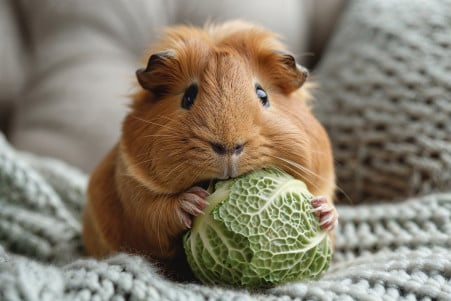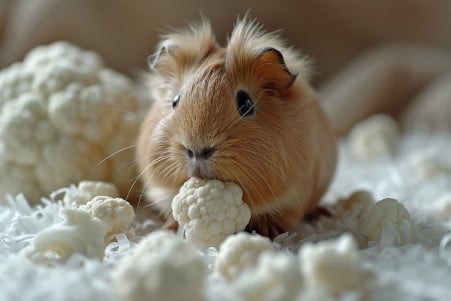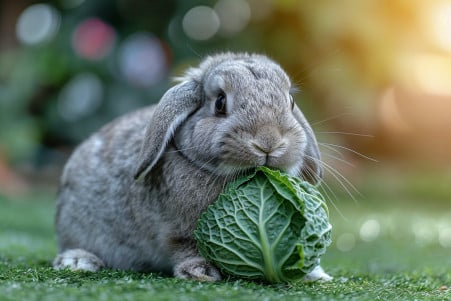Can Guinea Pigs Eat Red Cabbage? Nutritional Facts and Safety
5 June 2024 • Updated 4 June 2024

If you've ever wondered if your guinea pig can enjoy some of the bright red cabbage you have in your fridge, the answer is yes. Red cabbage is safe for guinea pigs to eat in moderation. While it is a good source of vitamin C and fiber, it can also lead to digestive problems if fed in excess. As a result, you should feed your adult guinea pig no more than 1-2 cups of red cabbage a couple of times a week.
When deciding which fresh foods to add to your guinea pig's diet, it's important to make sure you're following advice that's been vetted by experts in veterinary medicine and guinea pig care. By looking at research on guinea pig nutrition and the experiences of guinea pig owners, we can learn more about the benefits and potential drawbacks of adding red cabbage to the diet of these popular companion animals. This information can help you make sure you're feeding your guinea pig a diet that's healthy and nutritious while also ensuring that you're not inadvertently causing them any digestive issues.
Can guinea pigs eat purple cabbage?
Nutritional Powerhouse: The Benefits of Purple Cabbage for Guinea Pigs
Purple cabbage is a nutritional powerhouse that can provide numerous health benefits for guinea pigs. One of its standout qualities is being an excellent source of vitamin C, which guinea pigs cannot produce on their own. As reported by GuineaDad, in just 100 grams, purple cabbage contains a whopping 57 mg of this essential vitamin, crucial for boosting immunity and repairing tissues.
In addition to vitamin C, purple cabbage is a good source of fiber, with 2.1 grams per 100 grams. This fiber is important for healthy digestion and can also help control blood sugar and cholesterol, according to Guinea Piggles. Meanwhile, the 45 mg of calcium per 100 grams in purple cabbage can help guinea pigs maintain healthy bones and teeth.
However, what really makes purple cabbage stand out is its antioxidant content. It’s full of anthocyanins, which have been shown to have anti-inflammatory and heart-healthy effects. Meanwhile, Guinea Piggles notes that purple cabbage has higher levels of vitamins K, potassium, and manganese than green cabbage, all of which can help support guinea pigs’ health and immune function. As a result, purple cabbage’s wide range of nutrients can help guinea pigs in many ways, making it a valuable part of a healthy guinea pig diet.
Everything in Moderation: Watch Out for Overfeeding and Digestive Problems
Despite the many nutritional advantages of feeding purple cabbage to guinea pigs, it's important to do so in moderation to prevent digestive issues. The Southern California Guinea Pig Rescue lists cabbage as a food that should never be fed to guinea pigs due to potential problems. However, ExoticDirect explains that red cabbage, like purple cabbage, is high in vitamin C and can be fed often, but warns against overfeeding.
As Hepper explains, the fiber and calcium in purple cabbage can cause gas, bloating, diarrhea, and even bladder stones if consumed in large amounts. To prevent these digestive problems, it's important to introduce purple cabbage slowly and watch your guinea pig for signs of trouble, adjusting portion sizes as necessary. Making sure your guinea pig has access to fresh water and hay can also help ensure healthy digestion when feeding purple cabbage.
How to Balance the Guinea Pig Diet: Adding Purple Cabbage to the Mix
Guinea pigs have very specific dietary needs that must be met to ensure they are as healthy as possible. According to the Humane Society of the United States, fresh vegetables, including purple cabbage, should account for 8% of their daily diet, with hay making up 70% and fortified pellets making up 20%. Oxbow Animal Health also recommends that you rotate the different leafy greens and vegetables you feed your guinea pig to ensure they get a variety of nutrients.
If you are adding a new food like purple cabbage to your guinea pig's diet, Wheekcare suggests that you do so slowly over the course of two weeks to make sure your pet doesn't have an adverse reaction. You can also talk to a vet or a guinea pig owner with experience to get more personalized advice on what to feed your pet based on their specific needs.
How to Treat Vitamin C Deficiency: Using Purple Cabbage as a Source
Vitamin C deficiency is one of the most common nutritional problems in guinea pigs and can cause a variety of health problems. According to the Merck Veterinary Manual, one of the reasons for this is that guinea pigs are unable to synthesize their own vitamin C and must get it from their diet. If they don’t get enough, guinea pigs can experience symptoms like reduced collagen synthesis, joint swelling, bleeding, and lethargy.
Luckily, purple cabbage is high in vitamin C, with 57 mg per 100 grams, according to GuineaDad. So, adding purple cabbage to your guinea pig’s diet can help ensure they get enough vitamin C and don’t become deficient. This is especially important since Merck Veterinary Manual points out that the vitamin C in commercial guinea pig food can degrade over time, which means that guinea pigs need to get vitamin C from fresh foods like purple cabbage.
Conclusion: Purple Cabbage Can Be a Healthy and Beneficial Treat for Guinea Pigs
Purple cabbage can be a healthy and beneficial addition to a guinea pig's diet, but it should be fed in moderation. It offers essential nutrients like vitamin C, fiber, antioxidants, and minerals that can contribute to good health. However, it can also cause digestive issues and other potential problems if it's overfed.
Make sure to include purple cabbage as part of a varied diet that also includes hay, fortified pellets, and other fresh vegetables. Work with a vet or other experienced guinea pig owners to get personalized advice about the best diet for your guinea pig.


